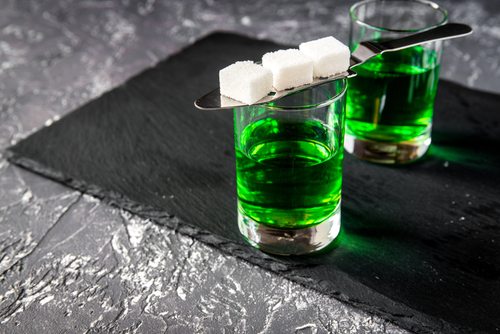What is Absinthe? It’s an herbal liquor consisting of anise, fennel and wormwood. The liquor is green in color, which is derived from the chlorophyll of the wormwood leaves. A component of wormwood is thujone, which can be toxic in high doses, and is known to block gamma-aminobutyric receptors in the brain, which can lead to convulsions.
Is Absinthe Dangerous?
In the past Absinthe was considered dangerous, as well as addictive, and thought to cause delirium, vertigo, hallucinations, epileptic attacks, even insanity. However, a modern analysis of the liquor shows that an individual is much more likely to die of alcoholism, alcohol poisoning or drinking unregulated Absinthe, which may contain other additives, and not from effects of the thujone in the liquor. The distillation that Absinthe goes through means that there is very little thujone left in it, and not enough to hurt an individual.
Absinthe used to be illegal in many European and Western countries. However, it is now legal in all countries where alcohol is legal. In 2007 the US lifted a 100 year ban on Absinthe, providing the liquor is free of thujone.
Absinthe Misinformation
Many people have misguided information about the dangers of Absinthe. The drink is dangerous due to it’s high alcohol content. Absinthe has a very high alcohol content, averaging between 55 to 75 percent or 110 to 114 proof. This means an individual drinking Absinthe can get intoxicated much faster. That can lead to impaired motor co-ordination, perception and judgment. It can cause reckless behavior and emotional instability, all of which are classic characteristics of intoxication. Furthermore, illegal concoctions of Absinthe may contain thujone. The greater danger is that it can be distilled by anyone, and can contain all sorts of poisonous additives and harmful chemicals.
Symptoms of Alcoholism
According to the National Institute on Alcohol Abuse and Alcoholism, the following are some of the symptoms of alcoholism:
- Cravings, a continuing compulsion to drink.
- Developing a tolerance and needed increasing amounts of alcohol to get high.
- Physical dependence, leading to withdrawal symptoms when an individual stops drinking, such as anxiety, nausea, and sweating.
- Loss of control over one’s ability to limit drinking.
Alcoholism also puts an individual at risk for a variety of health problems such as:
- Certain cancers, like of the liver, rectum, colon, larynx and the kidneys.
- Cirrhosis of the liver.
- Immune system obstructions.
- Brain damage.
- Increased likelihood of death from car accidents, work related accidents, recreational accidents and injuries, as well as homicides and suicides.
If an individual continues to abuse alcohol, including Absinthe, there is a strong possibility of damage to the brain and liver.
Do you have any questions about alcohol or Absinthe abuse? Call The Villa to find out how we can support your goals for sober living.

